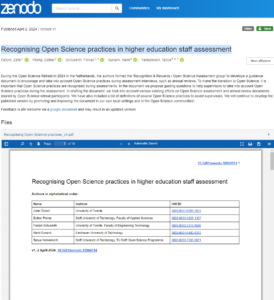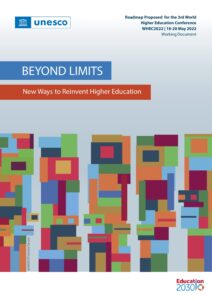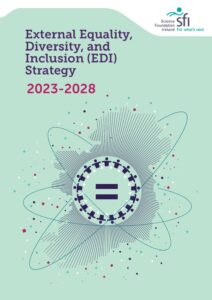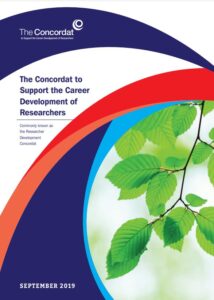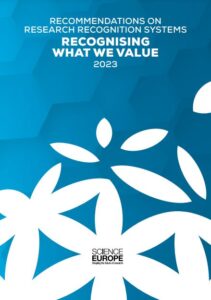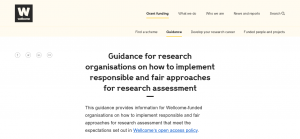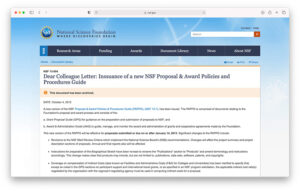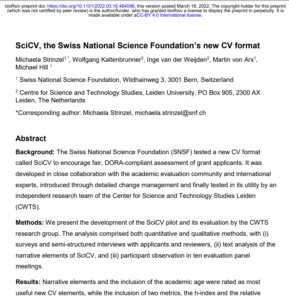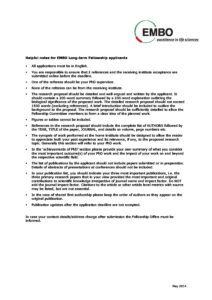A collection of materials to facilitate the development of responsible research and researcher assessment policies and practices.
Search and Filter
Resource type
Intended audience
Good practicesPolicies and guidance
For: FundersResearch institutes
2024
This resource compiles questions about open scholarship that pertain to assessment of research, education, outreach, and leadership. The questions for each section are accompanied by definitions of terms used in the questions and links to resources. The authors note that these questions were developed in the context of assessment practices in The Netherlands, but note…
Good practicesPolicies and guidance
For: FundersResearch institutes
2020
This resource compiles questions about open scholarship that pertain to assessment of research, education, outreach, and leadership. The questions for each section are accompanied by definitions of terms used in the questions and links to resources. The authors note that these questions were developed in the context of assessment practices in The Netherlands, but note…
Advocacy resourcesGood practicesPolicies and guidance
For: FundersProfessional societiesResearch institutes
2022
This document from UNESCO is a roadmap for higher education, prepared for the “3rd World Higher Education Conference (WHEC2022).” Within the roadmap are “signposts for co-creating more open, inclusive, equitable and collaborative higher education systems that democratize access and knowledge.” Recognizing the evolution of and advancements in higher education, UNESCO has outlined 5 sections discussing…
Good practicesInitiativesTools
For: FundersProfessional societiesResearch institutes
2024
The Young Universities for the Future of Europe (YUFE) Transforming R&I through Europe-Wide Knowledge Transfer (YUFERING) project is a comprehensive initiative aimed at transforming Research and Innovation (R&I) practices across Europe by facilitating widespread knowledge transfer. It seeks to bridge the gap between researchers, innovators, and stakeholders by promoting collaboration and communication through existing networks…
Good practicesInitiativesPolicies and guidance
For: FundersResearch institutes
2023
Science Foundation Ireland’s (SFI) Equality, Diversity, and Inclusion (EDI) Strategy 2023-2028 is centered on SFI’s ambition that “its EDI Strategy will be a key driver of an inclusive, engaged research culture and, through this Strategy, SFI will be an agent of change.” The Agency aims to “lead in minimising barriers and ensuring that everyone has…
Advocacy resourcesGood practicesPosition papers
For: FundersJournals and publishersProfessional societiesResearch institutes
There is a growing recognition that current evaluation metrics often fail to capture the breadth and depth of research impact. In hopes of addressing the reform needed in the research world the Global Young Academy, the InterAcademy Partnership, and the International Science Council have collaborated in conducting a global assessment of research evaluation perspectives. Their…
Good practicesTools
For: FundersResearch institutes
In 2022 Trinity College Dublin launched The Researcher Impact Framework (RIF), a tool designed to help researchers understand and communicate the impact of their work in four key areas: Knowledge generation Development of others and collaborations Contribution to the research community Addressing broader societal challenges The RIF originated from Trinity College Dublin’s Research Impact Pilot…
Good practices
For: FundersResearch institutes
2019
The Researcher Development Concordat is an agreement among organizations in the UK in support of career development of researchers. It outlines a set of principles and requirements aimed at fostering a sustainable research culture within UK research institutions. The Concordat is focussed on the rights and obligations of researchers who are primarily engaged in research…
Good practices
For: FundersResearch institutes
2022
The Adaptation Research Alliance (ARA) was launched at the United Nations Climate Change Conference in 2021 as a global collaborative effort for increased investment and action, to catalyze action oriented research for effective adaptation to climate change. The Principles are focused in supporting and influencing climate change adaptation initiatives, and research in general. The six…
Good practices
For: FundersResearch institutes
2023
Rewards and recognition play fundamental roles in identifying research and innovation talent. In 2022, Science Europe created the Science Europe Values Framework for research organizations. In this 2023 piece, Science Europe builds on its Values Framework and provides practical recommendations and good practice examples that can drive positive research culture at the institutional level. There…
Good practices
For: FundersJournals and publishersResearch institutes
2023
The Luxembourg National Research Fund (FNR) introduced a standardized narrative-style CV format in 2021 as a requirement for applicants to all of FNR’s funding schemes. This new format was introduced to streamline and simplify the evaluation process, broaden the types of contributions considered during review, and to align with DORA’s principles that research should be…
Good practices
For: Funders
2022
Strengthening equity in international research partnerships can help address the current power imbalances that characterize the global research ecosystem and improve the ethical integrity of research agendas and knowledge production. This document was jointly created by the UK Collaborative on Development Research (UKCDR) and ESSENCE on Health Research to provide practical advice and actionable steps…
Good practices
For: FundersResearch institutes
2022
Research Capacity Strengthening (RCS) is essential for developing people and institutions, fostering collaborations, and building supporting infrastructure that enables research actors to thrive. Through responsible funding and evaluation frameworks, inclusive and sustainable research capacity can be built. Recognizing this, in 2022 the UK Collaborative on Development Research (UKCDR) published a report that collates learnings from…
Good practices
For: Funders
2022
The fundamental activity of the ERC is to provide attractive, long-term funding to support Principal Investigators and their research teams to pursue ground-breaking, high-gain/high-risk research. The ERC puts particular emphasis on the frontiers of science and scholarship. In particular, it encourages proposals of a multi- or interdisciplinary nature which cross the boundaries between different fields…
Good practicesPolicies and guidance
For: Funders
As part of its open access 2020 policy, Wellcome-funded organizations are asked to publicly commit to the principle that when assessing research outputs – for example in hiring, promotion and tenure committees – they will consider the intrinsic merit of the work, not the title of the journal, its impact factor or the publisher.
Good practices
For: Funders
2012
The U.S. National Science Foundation has modified its instructions to grant applicants to recognize that the outputs of scientific research include more than just publications, an idea endorsed by DORA.
Good practices
For: Funders
2012
The U.S. National Institutes of Health has revised the format of the CV or “biosketch” in grant applications.
Good practices
For: Funders
The NWO is piloting a narrative CV format for assessment of early career researchers who apply to the Veni funding scheme.
Good practices
For: Funders
2022
The Swiss National Science Foundation is testing a structured narrative CV format called ‘SciCV’ to increase consistency in decision-making for its grant applications.
Good practicesPolicies and guidance
For: Funders
The ORFG released guidance for funders called, Incentivizing the sharing of research outputs through research assessment: a funder implementation blueprint.
Good practicesPosition papersTools
For: FundersResearch institutes
2016
The IDRC in Canada developed a tool called Research Quality Plus (RQ+) to assess applied and translational research.
Good practices
For: Funders
The Health Research Board (HRB) has taken several actions since 2016 to implement DORA’s principles in its grant review process.
Good practicesPosition papers
For: Funders
2017
Evaluation of Research Careers fully Acknowledging Open Science Practices, a report released by the European Commission in 2017, recognizes the emerging Open Science movement creates an opportunity to develop an evaluation system for hiring and promotion that is focused on the equal treatment of applicants.
Good practices
For: Funders
2014
The application process for EMBO Long-Term Fellowships emphasizes the most important outcomes and impact of the applicant’s work rather than where it is published and specifically states that journal impact factors should not be provided.
Good practices
For: Funders
2018
CRUK recognizes value from all outputs of research, including publications. CRUK has modified its grant application process to ask candidates to describe the significance and impact of 3-5 key research achievements, which can include preprints, training delivered, contribution to consortia, patents, and sharing of key datasets, software, novel assays and reagents, and research publications.


